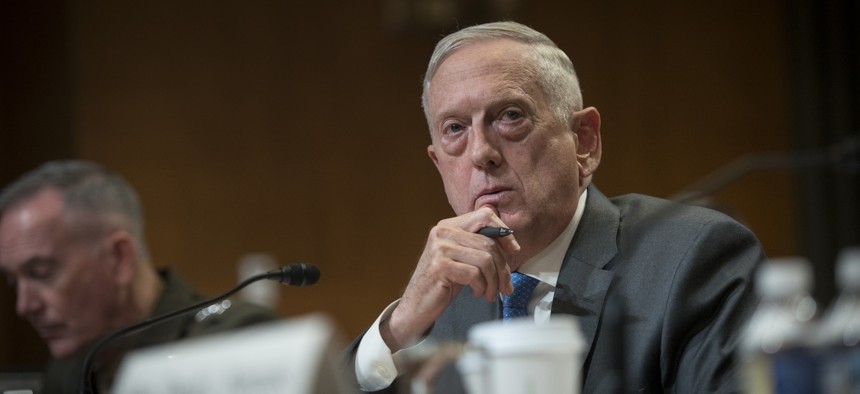
Tech Sgt. Vernon Young Jr./Defense Department
Mattis: Leaving the Nuclear Deal Will Help the U.S. Negotiate with Iran
Withdrawal will help the U.S. develop a ‘more compelling’ deal on a range of issues, SecDef told lawmakers.
President Trump’s decision to stop participating in the Iran nuclear deal gives the U.S. a “more compelling” case as it tries to curb various Iranian behaviors, Defense Secretary James Mattis told lawmakers Wednesday.
“The administration’s been in place for over a year, and for over a year we’ve attempted to work with allies to address the shortcomings of it,” Mattis told the Senate Appropriations defense subcommittee. “So I think we now have the opportunity to move forward to address those shortcomings and make it more compelling.”
Mattis said his “foremost” of five concerns was keeping Iran from getting a nuclear weapon.
Experts have noted that the nuclear deal reduced Iran’s ability to build such a weapon, and that if it collapses, so will the inspections and other limits that held Tehran’s nuclear ambitions in check. Last October, Mattis himself told lawmakers that it was in America’s interest to remain in the deal.
On Wednesday, he said, “We will work with our allies and try to bring Iran back into more responsible behavior, at the same time addressing all five of the threats that Iran constitutes: the nuclear issue which is foremost; certainly the terrorism issue that I just cited; the ballistic missile efforts they have; the cyber attacks they’ve been conducting; and then threats to international commerce.”
And Chairman of the Joint Chiefs of Staff Gen. Joseph Dunford, reminded that he also told lawmakers last year that the deal was "the most durable means of preventing Iran from acquiring a nuclear weapons capability," said today that his job was to support the president's decision.
"The president has changed the policy," the military's top uniformed official said. "My job now is to adjust to that reality and make sure I’m supporting the president’s policy."
Key allies share America’s concerns about Iranian activity. When French President Emmanuel Macron spent three days rubbing elbows — and maybe dandruff — in Washington last month on an official state visit, he laid out four pillars that France would like to see addressed in renewed talks with Iran.
But allies are also moving ahead independently, leaving the United States on the sideline as they vow to uphold the deal and continue working with Iran.
Inside the Pentagon, Mattis told lawmakers, walking away from the agreement would have little immediate impact on budgets and planning.
He didn’t answer whether Trump had specifically requested updated military options after leaving the agreement, but said the Pentagon periodically refreshes all standing military options, and more often if needed.
Whether or not the operational plans require updating, Mattis said, the 2019 budget request does not.
“I do not anticipate asking for more dollars,” he said. “Now should Iran doing something, that’s a different issue. But no, I’m not coming to you with an additional supplemental funding request.”







